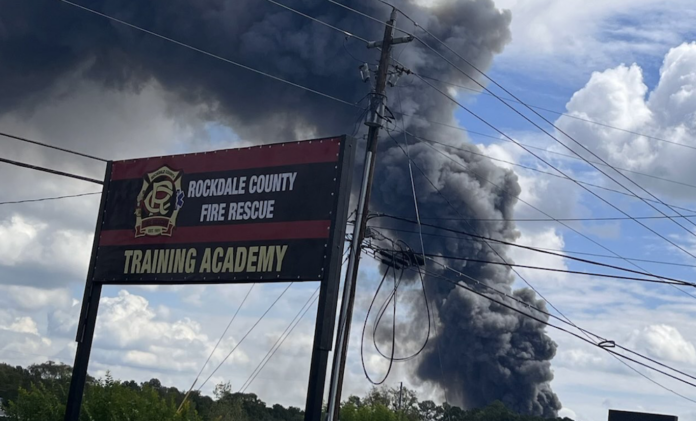
Nearly two months after a massive chemical fire at BioLab’s plant in Conyers, east of Atlanta, forced evacuations and raised environmental and health concerns, new details are emerging.
The U.S. Chemical Safety and Hazard Investigation Board (CSB), a nonregulatory federal agency, published an initial report from their investigation into the fire on Friday. The report called the September 29 incident “completely unacceptable,” citing the need for stricter safety protocols for handling hazardous materials.
According to the report, the fire began at around 5 a.m. when water reacted with trichloroisocyanuric acid (TCCA), a chemical used to treat pools and spas stored in BioLab’s Plant 12 warehouse. The TCCA was stored in super sacks weighing about 2,750 pounds each.
BioLab had established a permanent “fire watch” months before the fire after detecting strong odors in Plant 12. Two BioLab employees were on fire watch duty the morning the fire broke out. They were tasked with monitoring potential hazards, including leaks or water intrusions
At approximately 5:10 a.m., an employee called 911 after hearing a “popping sound” and noticing “large toxic vapor plumes,” though no flames were visible at the time. By 6:30 a.m., flames broke through the roof, and parts of the building began to collapse. Firefighters arrived to find hazardous conditions, including dense smoke and zero visibility, complicating their efforts to control the blaze.
The first fire was extinguished just after 8 a.m. Parts of the warehouse had collapsed and the situation worsened with a second, larger fire erupting later that day “producing thick black smoke, followed by multicolor plumes of smoke. An emergency responder described his observations of the scene as ‘major chemical reactions,’” according to the report.
“This incident and the substantial potential risk that it posed to the surrounding community was completely unacceptable,” CSB Chairperson Steve Owens said in a statement. “Reactive chemical incidents can have severe environmental and public safety impacts due to the combination of fire, toxic gas emissions, and hazardous materials involved, and BioLab and any other facility that has reactive chemicals onsite must manage those materials safely.”
The response
An incident report obtained by GPB from Rockdale County Fire and Rescue detailing the response that morning shows Rockdale County firefighters quickly calling for evacuations and deploying hazmat protocols.
Neighboring fire departments and hazmat teams from Atlanta, Newton County, Henry County, DeKalb County, and elsewhere were also called in through mutual aid agreements to help manage the situation.
Personnel were directed to remove as much hazardous product from the building, but the structural collapse of Plant 12 complicated the effort as debris trapped materials that continued to off-gas for weeks.
Ultimately, personnel dissolved the product in large tanks of fresh water to control fumes and prevent more chemical gas from being produced. The report called the process “tedious,” but said it was the best option they had found.







